Quick start Record class
Let's take a simple example to declare a user Record.
public record User(long id, String name, int age) {}
After the code is written in this way, the default elements and method implementations of the Record class include:
- The record header specifies the constituent elements (int id, String name, int age), and these elements are final.
- By default, record has only one constructor, which is a constructor containing all elements.
- Each element of record has a corresponding getter (but this getter is not getxxx(), but is directly named with the variable name, so the serialization framework is used, and the DAO framework should pay attention to this point)
- The implemented hashCode(), equals(), toString() method (implemented by automatically generating the bytecode implemented by hashCode(), equals(), toString() method in the compilation stage).
Let's use this Record:
User zhx = new User(1, "zhx", 29); User ttj = new User(2, "ttj", 25); System.out.println(zhx.id());//1 System.out.println(zhx.name());//zhx System.out.println(zhx.age());//29 System.out.println(zhx.equals(ttj));//false System.out.println(zhx.toString());//User[id=1, name=zhx, age=29] System.out.println(zhx.hashCode());//3739156
How is the structure of Record implemented
Insert bytecode of related fields and methods after compilation
There are two ways to view the bytecode of the above example: one is through javap - V user Class command to view the bytecode of the text version and intercept the important bytecode as follows:
//Omit file header, file constant pool
{
//The public constructor takes all attributes as parameters and assigns values to each Field
public com.github.hashzhang.basetest.User(long, java.lang.String, int);
descriptor: (JLjava/lang/String;I)V
flags: (0x0001) ACC_PUBLIC
Code:
stack=3, locals=5, args_size=4
0: aload_0
1: invokespecial #1 // Method java/lang/Record."<init>":()V
4: aload_0
5: lload_1
6: putfield #7 // Field id:J
9: aload_0
10: aload_3
11: putfield #13 // Field name:Ljava/lang/String;
14: aload_0
15: iload 4
17: putfield #17 // Field age:I
20: return
LineNumberTable:
line 3: 0
LocalVariableTable:
Start Length Slot Name Signature
0 21 0 this Lcom/github/hashzhang/basetest/User;
0 21 1 id J
0 21 3 name Ljava/lang/String;
0 21 4 age I
MethodParameters:
Name Flags
id
name
age
//toString method modified by public final
public final java.lang.String toString();
descriptor: ()Ljava/lang/String;
flags: (0x0011) ACC_PUBLIC, ACC_FINAL
Code:
stack=1, locals=1, args_size=1
0: aload_0
//The core implementation is the invokedynamic, which we will analyze later
1: invokedynamic #21, 0 // InvokeDynamic #0:toString:(Lcom/github/hashzhang/basetest/User;)Ljava/lang/String;
6: areturn
LineNumberTable:
line 3: 0
LocalVariableTable:
Start Length Slot Name Signature
0 7 0 this Lcom/github/hashzhang/basetest/User;
//hashCode method modified by public final
public final int hashCode();
descriptor: ()I
flags: (0x0011) ACC_PUBLIC, ACC_FINAL
Code:
stack=1, locals=1, args_size=1
0: aload_0
//The core implementation is the invokedynamic, which we will analyze later
1: invokedynamic #25, 0 // InvokeDynamic #0:hashCode:(Lcom/github/hashzhang/basetest/User;)I
6: ireturn
LineNumberTable:
line 3: 0
LocalVariableTable:
Start Length Slot Name Signature
0 7 0 this Lcom/github/hashzhang/basetest/User;
//equals method modified by public final
public final boolean equals(java.lang.Object);
descriptor: (Ljava/lang/Object;)Z
flags: (0x0011) ACC_PUBLIC, ACC_FINAL
Code:
stack=2, locals=2, args_size=2
0: aload_0
1: aload_1
//The core implementation is the invokedynamic, which we will analyze later
2: invokedynamic #29, 0 // InvokeDynamic #0:equals:(Lcom/github/hashzhang/basetest/User;Ljava/lang/Object;)Z
7: ireturn
LineNumberTable:
line 3: 0
LocalVariableTable:
Start Length Slot Name Signature
0 8 0 this Lcom/github/hashzhang/basetest/User;
0 8 1 o Ljava/lang/Object;
//getter of public modified id
public long id();
descriptor: ()J
flags: (0x0001) ACC_PUBLIC
Code:
stack=2, locals=1, args_size=1
0: aload_0
1: getfield #7 // Field id:J
4: lreturn
LineNumberTable:
line 3: 0
LocalVariableTable:
Start Length Slot Name Signature
0 5 0 this Lcom/github/hashzhang/basetest/User;
//getter of public modified name
public java.lang.String name();
descriptor: ()Ljava/lang/String;
flags: (0x0001) ACC_PUBLIC
Code:
stack=1, locals=1, args_size=1
0: aload_0
1: getfield #13 // Field name:Ljava/lang/String;
4: areturn
LineNumberTable:
line 3: 0
LocalVariableTable:
Start Length Slot Name Signature
0 5 0 this Lcom/github/hashzhang/basetest/User;
//getter of public modified age
public int age();
descriptor: ()I
flags: (0x0001) ACC_PUBLIC
Code:
stack=1, locals=1, args_size=1
0: aload_0
1: getfield #17 // Field age:I
4: ireturn
LineNumberTable:
line 3: 0
LocalVariableTable:
Start Length Slot Name Signature
0 5 0 this Lcom/github/hashzhang/basetest/User;
}
SourceFile: "User.java"
Record:
long id;
descriptor: J
java.lang.String name;
descriptor: Ljava/lang/String;
int age;
descriptor: I
//The following are the methods and parameter information that invokedynamic will call, which we will analyze later
BootstrapMethods:
0: #50 REF_invokeStatic java/lang/runtime/ObjectMethods.bootstrap:(Ljava/lang/invoke/MethodHandles$Lookup;Ljava/lang/String;Ljava/lang/invoke/TypeDescriptor;Ljava/lang/Class;Ljava/lang/String;[Ljava/lang/invoke/MethodHandle;)Ljava
/lang/Object;
Method arguments:
#8 com/github/hashzhang/basetest/User
#57 id;name;age
#59 REF_getField com/github/hashzhang/basetest/User.id:J
#60 REF_getField com/github/hashzhang/basetest/User.name:Ljava/lang/String;
#61 REF_getField com/github/hashzhang/basetest/User.age:I
InnerClasses:
public static final #67= #63 of #65; // Lookup=class java/lang/invoke/MethodHandles$Lookup of class java/lang/invoke/MethodHandles
The other is through the jclasslib plug-in of IDE. I recommend this method. The viewing results are as follows:
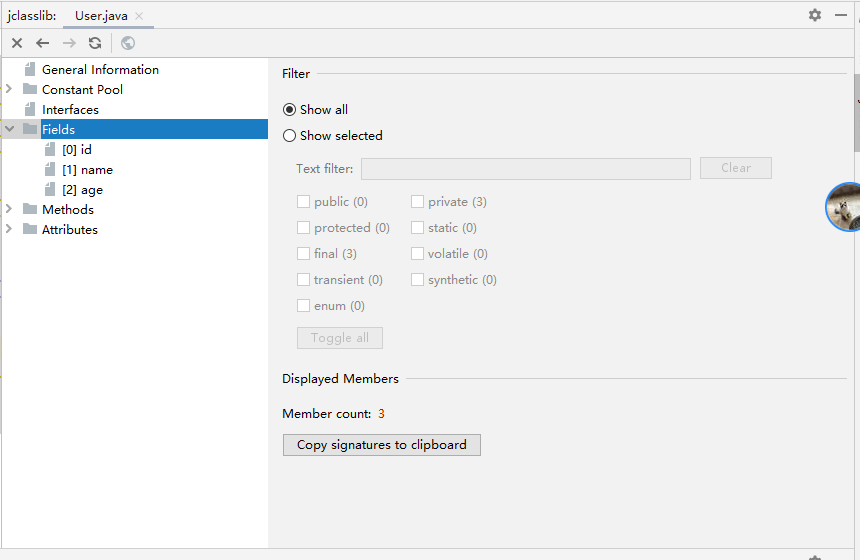
Automatically generated private final field

Auto generated full attribute constructor
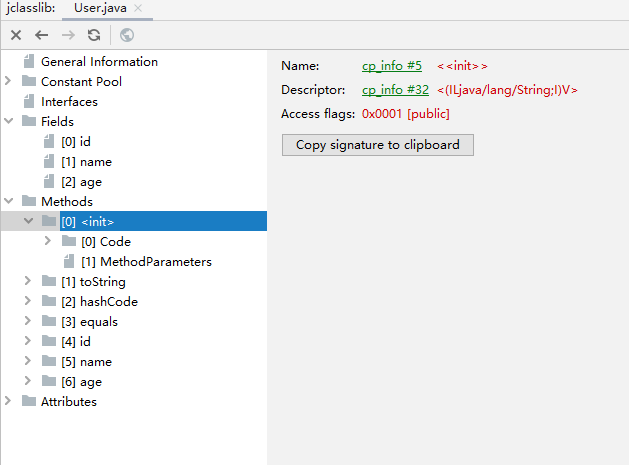
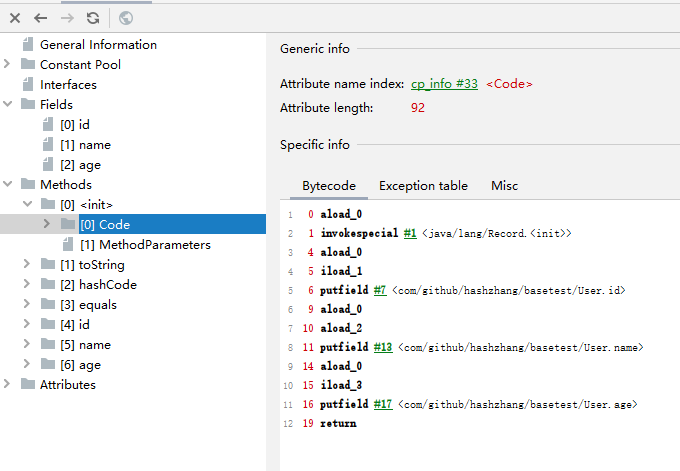
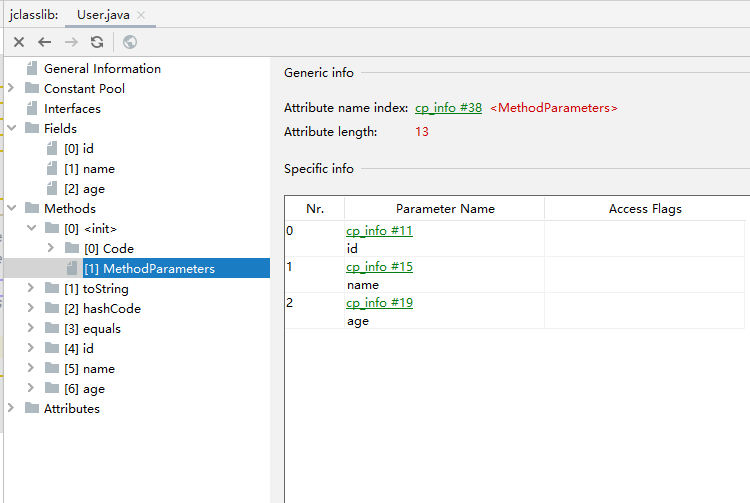
Auto generated public getter method
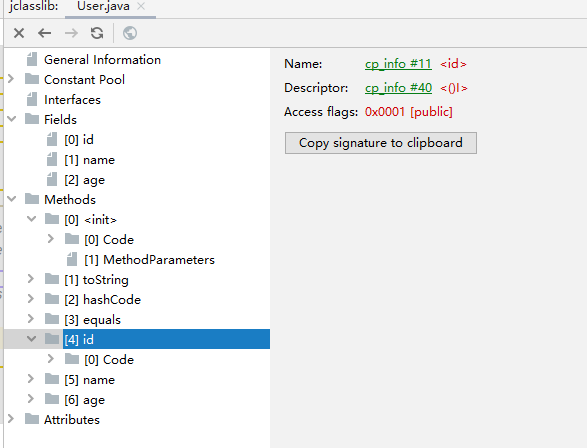
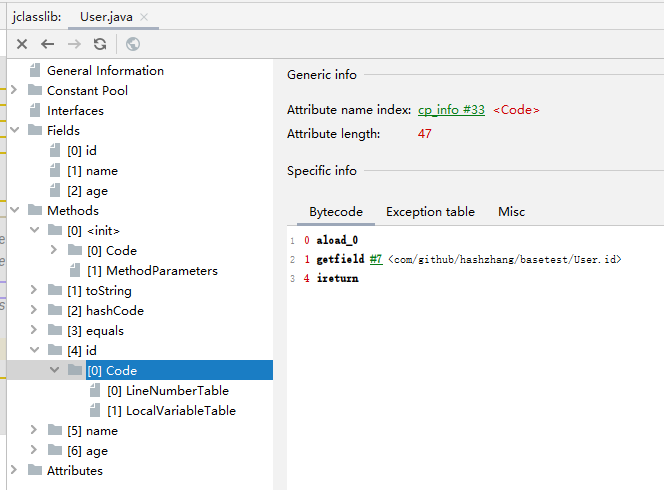
Automatically generated hashCode(), equals(), toString() method
The core of these methods is invokedynamic:
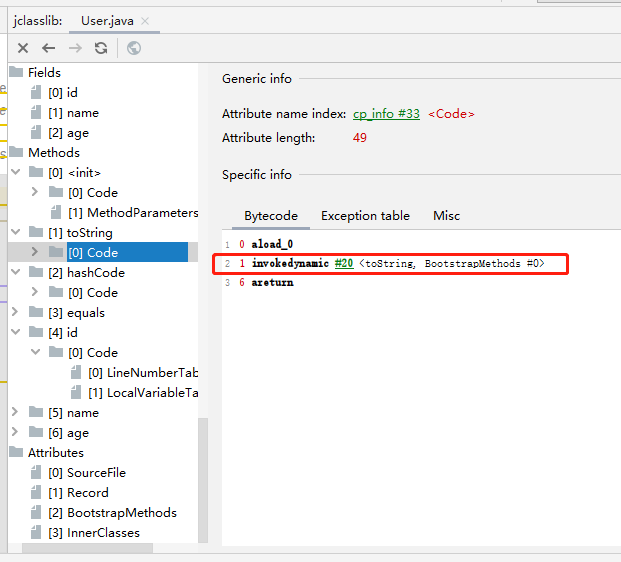
It looks like calling another method. Isn't this indirect call a performance loss problem? JVM developers have thought of this. Let's first learn about invokedynamic.
Background of invokedynamic
Java was originally a statically typed language, that is, the main process of its type checking was mainly at compile time rather than run time. In order to be compatible with the dynamic type syntax and the JVM can be compatible with the dynamic language (the JVM is not designed to only run Java), the bytecode instruction invokedynamic is introduced in Java 7, which is also the basis for the implementation of ramda expression and var syntax in Java 8.
invokedynamic and MethodHandle
invokedynamic is inseparable from Java Use of lang.invoke package. The main purpose of this package is to provide a new mechanism for dynamically determining the target method, called MethodHandle, in addition to relying solely on symbolic references to determine the called target method.
Through the MethodHandle, you can dynamically obtain the method you want to call for calling, which is similar to Java Reflection. However, in order to pursue performance efficiency, you need to use the MethodHandle. The main reason is that Reflection is only a supplementary implementation for Reflection in the Java language, without considering the problem of efficiency, In particular, JIT can hardly effectively optimize this kind of Reflection call. MethodHandle is more like the simulation of method instruction call of bytecode. If it is used properly, JIT can also optimize it. For example, declare the method reference related to MethodHandle as static final:
private static final MutableCallSite callSite = new MutableCallSite(
MethodType.methodType(int.class, int.class, int.class));
private static final MethodHandle invoker = callSite.dynamicInvoker();
Implementation of automatically generated toString(), hashcode(), equals()
It can be seen from the bytecode that incokedynamic actually calls the #0 method in bootstrappmethods:
0 aload_0 1 invokedynamic #24 <hashCode, BootstrapMethods #0> 6 ireturn
The bootstrap method table includes:
BootstrapMethods:
//The actual call is Java lang.runtime. Boost method of objectmethods
0: #50 REF_invokeStatic java/lang/runtime/ObjectMethods.bootstrap:(Ljava/lang/invoke/MethodHandles$Lookup;Ljava/lang/String;Ljava/lang/invoke/TypeDescriptor;Ljava/lang/Class;Ljava/lang/String;[Ljava/lang/invoke/MethodHandle;)Ljava
/lang/Object;
Method arguments:
#8 com/github/hashzhang/basetest/User
#57 id;name;age
#59 REF_getField com/github/hashzhang/basetest/User.id:J
#60 REF_getField com/github/hashzhang/basetest/User.name:Ljava/lang/String;
#61 REF_getField com/github/hashzhang/basetest/User.age:I
InnerClasses:
//Declare methodhandles Lookup is final, which speeds up the calling performance. In this way, calling the methods in bootstrappmethods can achieve performance similar to direct calling
public static final #67= #63 of #65; // Lookup=class java/lang/invoke/MethodHandles$Lookup of class java/lang/invoke/MethodHandles
From here, we can see that toString() actually calls Java lang.runtime. The bootstrap() method of objectmethods. Its core code is:
ObjectMethods.java
public static Object bootstrap(MethodHandles.Lookup lookup, String methodName, TypeDescriptor type,
Class<?> recordClass,
String names,
MethodHandle... getters) throws Throwable {
MethodType methodType;
if (type instanceof MethodType)
methodType = (MethodType) type;
else {
methodType = null;
if (!MethodHandle.class.equals(type))
throw new IllegalArgumentException(type.toString());
}
List<MethodHandle> getterList = List.of(getters);
MethodHandle handle;
//Process the corresponding logic according to the method name, corresponding to the implementation of equals(), hashCode(), toString()
switch (methodName) {
case "equals":
if (methodType != null && !methodType.equals(MethodType.methodType(boolean.class, recordClass, Object.class)))
throw new IllegalArgumentException("Bad method type: " + methodType);
handle = makeEquals(recordClass, getterList);
return methodType != null ? new ConstantCallSite(handle) : handle;
case "hashCode":
if (methodType != null && !methodType.equals(MethodType.methodType(int.class, recordClass)))
throw new IllegalArgumentException("Bad method type: " + methodType);
handle = makeHashCode(recordClass, getterList);
return methodType != null ? new ConstantCallSite(handle) : handle;
case "toString":
if (methodType != null && !methodType.equals(MethodType.methodType(String.class, recordClass)))
throw new IllegalArgumentException("Bad method type: " + methodType);
List<String> nameList = "".equals(names) ? List.of() : List.of(names.split(";"));
if (nameList.size() != getterList.size())
throw new IllegalArgumentException("Name list and accessor list do not match");
handle = makeToString(recordClass, getterList, nameList);
return methodType != null ? new ConstantCallSite(handle) : handle;
default:
throw new IllegalArgumentException(methodName);
}
}
The core implementation logic of toString() method depends on the branch of case "toString". The core logic is makeToString(recordClass, getterList, nameList):
private static MethodHandle makeToString(Class<?> receiverClass,
//All getter methods
List<MethodHandle> getters,
//All field names
List<String> names) {
assert getters.size() == names.size();
int[] invArgs = new int[getters.size()];
Arrays.fill(invArgs, 0);
MethodHandle[] filters = new MethodHandle[getters.size()];
StringBuilder sb = new StringBuilder();
//Splice class name first[
sb.append(receiverClass.getSimpleName()).append("[");
for (int i=0; i<getters.size(); i++) {
MethodHandle getter = getters.get(i); // (R)T
MethodHandle stringify = stringifier(getter.type().returnType()); // (T)String
MethodHandle stringifyThisField = MethodHandles.filterArguments(stringify, 0, getter); // (R)String
filters[i] = stringifyThisField;
//After splicing, field name = value
sb.append(names.get(i)).append("=%s");
if (i != getters.size() - 1)
sb.append(", ");
}
sb.append(']');
String formatString = sb.toString();
MethodHandle formatter = MethodHandles.insertArguments(STRING_FORMAT, 0, formatString)
.asCollector(String[].class, getters.size()); // (R*)String
if (getters.size() == 0) {
// Add back extra R
formatter = MethodHandles.dropArguments(formatter, 0, receiverClass);
}
else {
MethodHandle filtered = MethodHandles.filterArguments(formatter, 0, filters);
formatter = MethodHandles.permuteArguments(filtered, MethodType.methodType(String.class, receiverClass), invArgs);
}
return formatter;
}
Similarly, the implementation of hashcode() is:
private static MethodHandle makeHashCode(Class<?> receiverClass,
List<MethodHandle> getters) {
MethodHandle accumulator = MethodHandles.dropArguments(ZERO, 0, receiverClass); // (R)I
// For each field, find the corresponding hashcode method, take the hash value, and finally combine them together
for (MethodHandle getter : getters) {
MethodHandle hasher = hasher(getter.type().returnType()); // (T)I
MethodHandle hashThisField = MethodHandles.filterArguments(hasher, 0, getter); // (R)I
MethodHandle combineHashes = MethodHandles.filterArguments(HASH_COMBINER, 0, accumulator, hashThisField); // (RR)I
accumulator = MethodHandles.permuteArguments(combineHashes, accumulator.type(), 0, 0); // adapt (R)I to (RR)I
}
return accumulator;
}
Similarly, the equals() implementation is:
private static MethodHandle makeEquals(Class<?> receiverClass,
List<MethodHandle> getters) {
MethodType rr = MethodType.methodType(boolean.class, receiverClass, receiverClass);
MethodType ro = MethodType.methodType(boolean.class, receiverClass, Object.class);
MethodHandle instanceFalse = MethodHandles.dropArguments(FALSE, 0, receiverClass, Object.class); // (RO)Z
MethodHandle instanceTrue = MethodHandles.dropArguments(TRUE, 0, receiverClass, Object.class); // (RO)Z
MethodHandle isSameObject = OBJECT_EQ.asType(ro); // (RO)Z
MethodHandle isInstance = MethodHandles.dropArguments(CLASS_IS_INSTANCE.bindTo(receiverClass), 0, receiverClass); // (RO)Z
MethodHandle accumulator = MethodHandles.dropArguments(TRUE, 0, receiverClass, receiverClass); // (RR)Z
//Compare whether the getter of each field of the two objects obtains the same value. For the reference type, use objects Equals method, for the original type, directly through==
for (MethodHandle getter : getters) {
MethodHandle equalator = equalator(getter.type().returnType()); // (TT)Z
MethodHandle thisFieldEqual = MethodHandles.filterArguments(equalator, 0, getter, getter); // (RR)Z
accumulator = MethodHandles.guardWithTest(thisFieldEqual, accumulator, instanceFalse.asType(rr));
}
return MethodHandles.guardWithTest(isSameObject,
instanceTrue,
MethodHandles.guardWithTest(isInstance, accumulator.asType(ro), instanceFalse));
}
I'm involved Nuggets' popularity list in 2021 , please vote for me. Thank you
